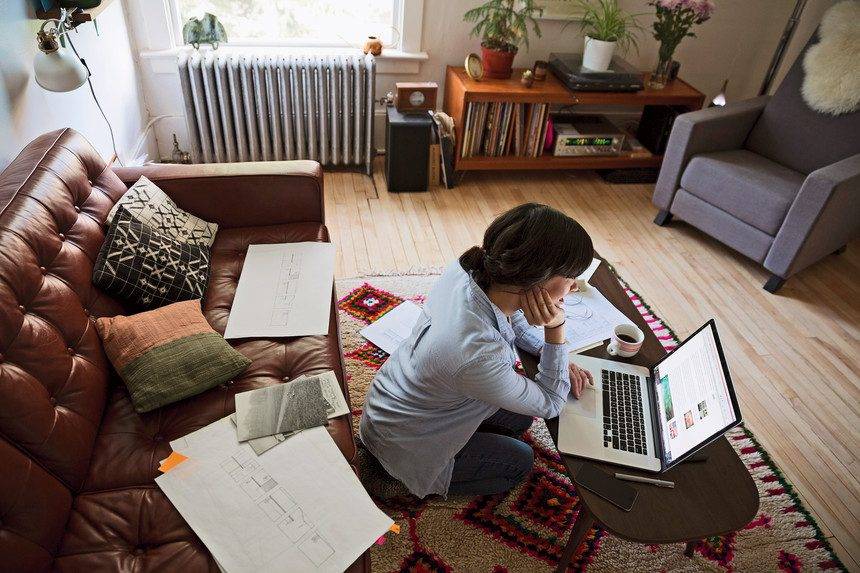African Parents Are Finally Catching The Logic Of Working From Home

Kareem got up by 7 AM Ghanaian time to prepare for an 8 AM work call time. He can afford to do so an hour before only because his company now allows working from home.
The sales dev rep did pushups, freshened up and wore cleaner clothes. He powered up his Macbook, to find he’s 5 minutes early for a daily Zoom call with the entire team.
After exchanging pleasantries and catching up on one another’s weekend for less than 2 minutes, Kareem’s boss started dishing out lags for the past week and the way to avoid them going forward.
And, most of the errors fell on the part of Kareem, who at this point thought it serious to buckle up and double down. That was when his mother barged into the room to the glare of the whole (virtual) team. The 40-year-old woman, surprisingly, said, “Maakyé, are you not going to work today?”
Perception
For many African youths whose jobs come with the work-from-home option, explaining the remote concept to their parents is often as challenging as Kareem’s. Getting some of these senior citizens to understand you don’t have to put on work clothes and get on a vehicle to an office is one Mission Impossible—unlike in other places of the world.
To be fair, the concept of working from home is relatively new, especially in a place like Africa. The internet fully came to the continent in August 1995. Around that time, only 20 nations in the region had access. It is only now that the internet has really penetrated Africa, which has made the continent the cradle of mobile money.

But more than 20 years down the line, adult Africans who lived in a time of toiling under the scorching sun are skeptical about their children working from home. Even those who worked in the civil service or in some other public capacity still raise an eyebrow.
Training a child for more than 2 decades only for him/her to sit behind a computer probably for the rest of their working years is not something most of them see as “success”. Except they are running a personal business driven by the technology they hear of, they’d still want “the best for their children”.
Parents generally want children they can be proud of. It’s their well-deserved reward. This usually comes from knowing their wards are “doing well.” But they have not yet gotten to appreciate how diverse work is, and the many ways that the internet has made that possible.
Interest Conflict
Ogini Nonso, an executive assistant, is now working from home for the first time in her 2-year career. Before the outbreak of the coronavirus pandemic, she had to shuttle between Surulere and Lekki Phase 1 to get to work everyday. But confirmed cases in Nigeria’s worst-hit city are now 111, which means there’s no better time to activate remote work.
In a conversation with WeeTracker, Nonso said her mother feels more relaxed knowing she’s home and not out there. But, the seemingly trickier thing, is that the parent does not fully understand what it entails for an executive assistant with a investment firm to work from home during such times—when businesses are taking heavy hits.
“We are all at home trying to stay safe from COVID-19 spread. I still have to do chores once it is 5 or 6 PM—which is earlier than I would, considering getting home in Lagos traffic. However, sometimes, she tries to get me to do something for her while I’m in the middle of work. If I tell her I’m busy, it often ticks her off,” she explained.
More young Africans are finally working from home. Even though not all employers bought the idea initially, a global pandemic has changed that by much.
For instance, ROAM Africa, which has 400 staff in 7 African countries, is now adopting the work-from-home model for the first time ever. However, observing protocol and turning in good numbers seems to lie on the agreement, trust and understanding between parent and child.
For a middle-aged parent who mostly listens to the radio and gathers with friends around newspaper stands, a stay-at-home-work is mostly strange. But due to a coronavirus crisis which is now in most African countries, they have the time and reasons to finally understand why remote work is real, legit and profitable.
Trust
The first thing that could pop into the mind of a senior citizen when their child or ward tells them they got a work-from-home job that involves using a laptop is: fraud. It’s not something everyone is keen on talking about, but that’s the reality. However, family trust plays a huge role in keeping these misgivings checked.
Kofi Genfi is the co-founder of software innovation company CYST and CEO of Accra-based fintech Mazzuma. The 26-year-old entrepreneur told WeeTracker that he is living with his parents while the rest of the team works from home for the time being. Ghana’s 3 major cities have gone into a 14-day lockdown to contain the viral outbreak.
“I worked from home for some couple of days in the past, before COVID-19. My parents were there. Even though it could have seemed strange, they know I am a grown man who can make good decisions. Trust, in this case, needs to overshadow familiarity—which is being used to going to work in offices in their own days,” he explained.
Kofi’s opinion on trust rhymes with that of Shalom Dickson, Lead Solutions Designer at Internovent—a social innovation company developing solutions for developing economies. When he started out working from home at his parents’, it was a little difficult internally to convey that something important was happening even if it didn’t seem like it.
The case was worse in one way and better in another. It was worse, in that, he was starting a company (Paperloops) and so things were not very structured. It was better because Shalom had a nice room specifically for work. But he still had to run sudden errands like going to the bank every now and then.
There were external pressures from other parents who knew he wasn’t heading out with “shirt and tie” daily. They suspected it could be something odd he was doing with computers. But since things were settled at home (for the most part) Shalom was shielded from all those judgments. His father would vouch for him every time.
Level Of Understanding
“In general, we could agree that relating to a culture that one is not trained in is difficult. This does not apply any less to work cultures. People from older generations, particularly African parents, are psychologically invested in the ‘getting up daily and heading to work’ culture”. Shalom told WeeTracker.
He continued: “For one, they can’t relate to whatever kind of sense of purpose and responsibility one could have in waking up daily to simply do something on the internet. What might convince them otherwise is when they see the financial reward. I can think of two main problems, from their perspective, with accepting the internet work culture”.
The first is the fear of the possibility of their ward participating in fraudulent activities. The other, where the first fear stems from, is a lack of awareness of how exactly the internet works. Parents who endorse remote work have a relatively sound grasp of the vast possibilities of the Internet.
On the other hand, the parents who do not are basically fish out of water on the internet. They likely don’t see a full-functioning virtual society, but rather a game with limited moves. Whatever goes beyond that in their imagination risks falling in the category of fraud.
Major cities across Africa are on lockdown. Businesses that are not in the banking, food or pharmaceutical sectors are now taking things more online. With more young people at home alongside their parents, senior citizens’ level of understanding for remote work is significantly increasing.
Urgency
“It’s great that, in the face of this coronavirus crisis, we have a platform like the internet and layers like social networks to communicate. If these older generation folks are getting to appreciate how much can really go on over the internet, it may have the positive effect of understanding that their wards who work from home can be doing legit, responsible work,” Shalom concludes.
For Obayuwana Confidence, an Admin/Information Manager and co-founder of PrimeXBranding, getting parents to understand the work-from-culture pretty much depends on necessity and urgency.
For all his work life, he’s been under the same roof with his parents. That’s probably because they know their ward has the makings of a cybernaut.
“My parents have been away since I started working from home this period. However, they do get the concept of working from home as I did work from home for 4 months after my NYSC (a scheme set up by the Nigerian government to involve Nigerian graduates in nation building and the development of the country).
Before the explosion of the internet in Africa, Nigeria precisely, it was not possible to work from home. That shaped the mindset of the senior citizens,” he told WeeTracker.
Featured Image: Guardian.ng